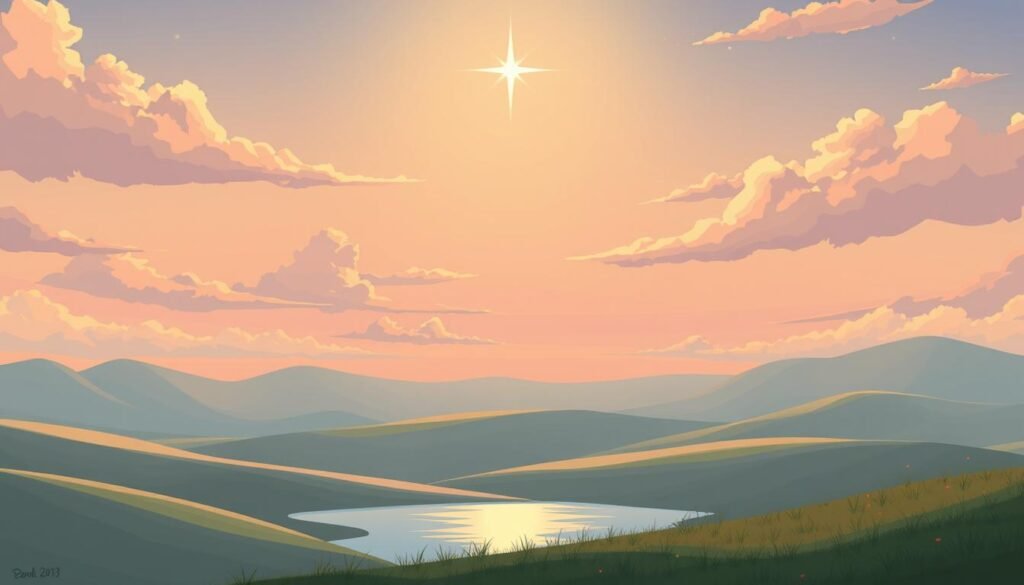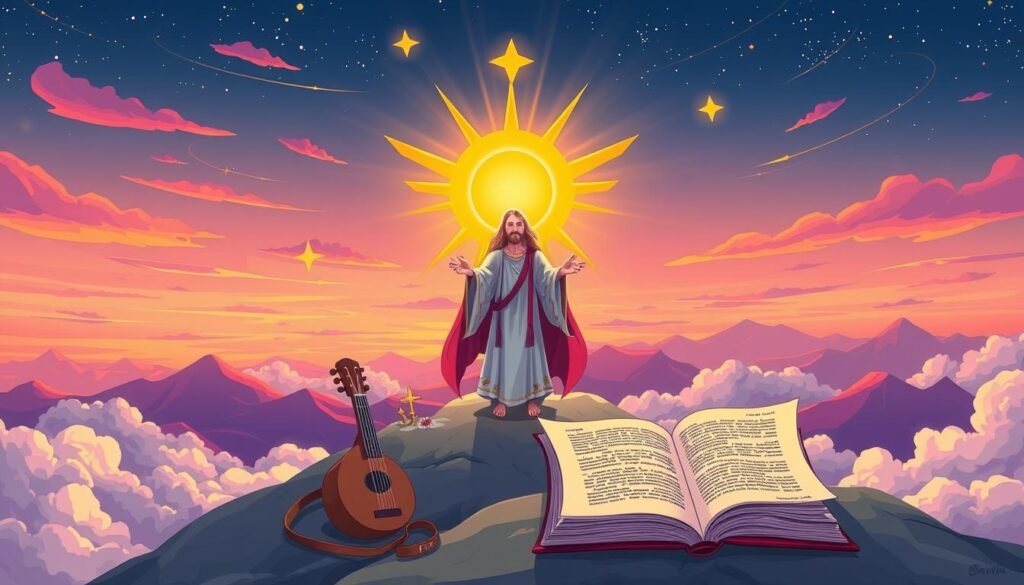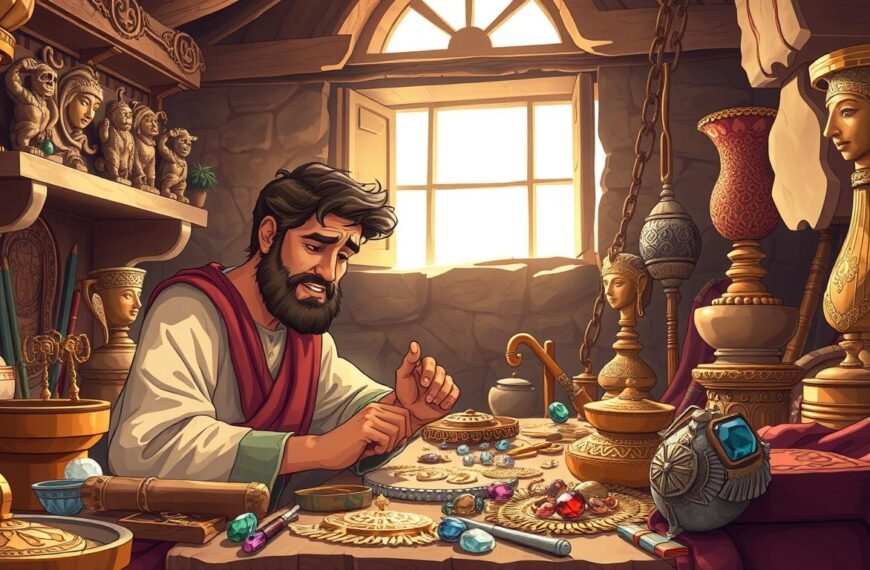What if the Morning Star, a term often linked with brightness and hope, also has a deep meaning? The identity of the Morning Star is key to understanding the Bible’s deep messages. This term is not just a pretty phrase; it has many meanings tied to different characters and ideas in the Bible.
In Isaiah 14:12, the Morning Star is seen as a symbol of light tied to a divine being. This sets up two main ways to see its meaning. In Revelation 22:16, the term becomes the “bright morning star,” a title Jesus Christ uses. This shows the biblical interpretation of power and hope for followers. Exploring the Morning Star means looking into old texts and debates that show its big cultural and spiritual importance.
As we explore this interesting scripture, we’ll see how the morning star stands for both divine power and the chance for trickery. It’s a complex symbol in Christian beliefs. Let’s go on this enlightening trip together. We’ll uncover the deep meanings behind the term and its role in faith today.
Understanding the Term “Morning Star”
The term “Morning Star” has many meanings. It mainly talks about the planet Venus in the morning sky. It’s seen as a symbol of light and change, bringing hope and new beginnings.
In the Bible, the Morning Star is very important. It shows the light that comes before a new day. The Bible talks about light and darkness, showing the fight between good and bad.
People who believe in the Bible see themselves as carrying Christ’s light. The Morning Star reminds them to stay true to their faith. It’s a call to be aware and strong in their beliefs.
The Origin of the Morning Star in Scripture
The term “Morning Star in scripture” is very important. It comes from ancient texts and is found in prophetic writings. For example, in Isaiah 14:12, it is called “Lucifer” in the Latin Vulgate.
“Lucifer” originally meant the morning star, or Venus. It symbolized brightness and light.
In many interpretations, the term shows a dual theme in scripture. It talks about both good and rebellion. Even though modern translations use “morning star” or “shining one,” the meaning stays the same.
Early civilizations saw Venus as a light-bringer. They included it in their stories and myths.
The morning star is also key to understanding light and darkness in the Bible. It shows the contrast between light and dark. This connects it to the wider universe in ancient texts.
Who Is The Morning Star In The Bible?
The term “Morning Star” is very important in the Bible. It means different things in different places. It talks about Jesus and Satan in interesting ways.
The Biblical References to Morning Star
In Isaiah and Revelation, the Morning Star is mentioned. Isaiah 14:12 talks about Lucifer, or Satan, falling from grace. This is very different from Revelation 22:16, where Jesus is called the bright morning star. He brings hope and renewal.
The morning star shows us light and darkness. It tells us about the characters’ nature and roles.
Interpretations of Morning Star in Different Translations
Translations of Morning Star show different views. The Latin Vulgate calls it “Lucifer.” Modern versions might say “shining one” or “daystar.”
In the Hebrew Bible, the morning star is about brightness and being special. It shows its two sides in different places. This shows a deeper conflict in the Bible.

Satan as the Morning Star
The Bible tells us about Satan as the Morning Star. This is mentioned in Isaiah 14:12. It talks about a being who fell from a high place, seen as Satan by many.
The phrase “son of the morning” shows his bright start before he rebelled against God.
Satan’s Fall Described in Isaiah 14
In Isaiah 14:12, Satan is called the “Day Star, son of Dawn.” This shows his bright power that has faded. His story is one of light turning to darkness, showing a big change in his role.
This change is also seen in Jesus Christ, who calls himself the “bright morning star” in Revelation 22:16.
Understanding the Title “Lucifer”
The word “Lucifer” means “light bearer” or “morning star” in Latin. It shows a contrast between glory and fall. Modern translations use “morning star” to make it clearer.
Seeing Lucifer as Satan in Isaiah 14:12 shows a deep symbolism. It shows how purity turned to evil. This change shows Satan’s role in the story of good and evil.
Jesus Christ as the Morning Star
The title of Jesus as the Morning Star is very important in Christian beliefs. It shows His divine nature and what people expect from Him. Revelation 22:16 says Jesus is the Morning Star, which is a key moment in understanding His role.
This title means more than just light. It also means hope, salvation, and truth for believers.
Revelation 22:16 and Jesus’ Declaration
In Revelation 22:16, Jesus calls Himself the Morning Star. This connects Him to a prophecy in Numbers. It shows He guides and reveals truth to those who look for Him.
Translations like the New International Version and the English Standard Version use different words. But they all show Jesus is the bright and shining one. This makes us understand His purpose better.
Comparison between Jesus and Satan’s Titles
Jesus is the Morning Star, and Satan is called the ‘morning star’ in Isaiah. They are very different. Jesus stands for righteousness, hope, and truth.
Satan, on the other hand, is about deceit and rebellion. Their titles show a big difference. Jesus is about fulfilling prophecies and saving humanity.
The Symbolism of the Morning Star
The Morning Star symbolizes hope, purity, and the fight between light and darkness in the Bible. It is a spiritual metaphor that guides believers. In the Book of Revelation, it shows up three times, always linked to Christ.
Revelations 22:16 says Jesus is the “bright Morning Star.” This shows light can overcome darkness. It gives hope to those who keep believing.
Scripture also links the Morning Star to winning over worldly challenges. Revelation 2:28 says those who succeed get the Morning Star. It’s a sign of victory.
Job 38:7 talks about angels celebrating creation as “morning stars.” This connects light to divine joy and power.
The Morning Star’s meaning is rich and complex. It shows the thin line between good and evil. Satan is called Lucifer, the “light bearer,” but Christ is the true light.
The Morning Star reminds us of hope and light in the dark. It encourages believers to seek and embrace their faith’s light.
The Dual Nature of the Morning Star in Christianity
The Morning Star in Christianity shows a big difference. Jesus Christ is seen as the light and savior. He is the Morning Star, as said in Revelation 22:16. His words bring hope and clear morals, helping people through life’s tough times.
But, some see the Morning Star as Satan or Lucifer. They think of him as evil and against God’s will. This shows a big fight between good and bad, a key idea in Christian beliefs.
Experts look at the Morning Star’s meaning in the Bible. They talk about Isaiah 14:12, linking it to Satan’s fall and the king of Babylon. This makes people think about how Lucifer changed from light to darkness. Early Church leaders mixed old beliefs with new teachings, shaping our views.
Looking at the Morning Star’s two sides helps people understand faith better. It makes them think about their choices, showing the big difference in human life. The Morning Star is more than a symbol; it reminds us of the spiritual battles in Christianity.
Historical and Cultural Context of the Morning Star
The Morning Star has deep cultural ties that shape its meaning in the Bible. In ancient Rome and Greece, it was seen as a special star. It was linked to Venus, a goddess of beauty and love.
These cultures told many myths about the Morning Star. They saw it as a sign of beauty and divine presence. This made the Morning Star very important to them.
Roman and Greek Associations
The Morning Star was key in Greek and Roman myths. For the Greeks, it was linked to Aphrodite, the goddess of love. The Romans saw it as Venus, the dawn goddess.
This shows how much the Morning Star meant to them. It was a symbol of beauty and divine presence. This adds depth to its meaning in the Bible.
The Morning Star in Canaanite Mythology
In Canaanite mythology, the Morning Star had its own story. It was tied to gods and goddesses, telling tales of ambition and downfall. These stories share themes with the Bible.
They show the Morning Star as a symbol of judgment and the rise and fall of leaders. This gives us a richer understanding of its cultural and spiritual significance.
Literary Representations of the Morning Star
The Morning Star is a big deal in literary symbolism. It shows up in many works, not just religious texts. Writers, poets, and artists use it to talk about divinity, hope, and dreams.
It’s a symbol of light and hope in stories. This makes it very important in our culture. It helps shape our stories and beliefs.
In references in literature, the Morning Star is everywhere. It’s not just in the Bible. It’s in poems and stories too.
It stands for the fight between light and dark. This fight is common in stories about change and finding forgiveness. Many famous books use light and shadow to show moral battles.
The analogy of Morning Star also means enlightenment and guidance. It brings a feeling of new beginnings. Authors use this to make readers think about their own journeys.
It shows us the search for understanding in life. This search is something we all go through.

Theological Significance of the Morning Star
The Morning Star has deep meaning in Christian belief. It shows God’s rule over all. It also shows the fight between good and evil.
The title reminds us of God’s power. This is especially true when we think of Lucifer, the rebel. This shows how important God’s rule is.
How the Morning Star Reflects God’s Dominion
In the Bible, the Morning Star is mentioned often. It’s mainly in Revelation 22:16, where it talks about Jesus. This gives believers hope and assurance.
The Morning Star is more than just a name. It shows God’s control and light in the dark. Jesus being the Morning Star means His kingdom is coming.
This idea also connects to the planet Venus. Venus shines bright at dawn and dusk. This adds to its meaning, showing hope and light in dark times.
2 Peter 1:19 tells us to stay alert. It says the message of Jesus is like a light in a dark world. Knowing who Jesus is is key in tough times.
The Morning Star guides us and looks forward to God’s promises. It tells us to spread the truth as the day comes.
The Morning Star in Christian Eschatology
In Christian eschatology, the Morning Star is more than a symbol. It’s a deep hope for final redemption and God’s plan. Jesus Christ is called the “Bright and Morning Star” in Revelation 22:16. This brings light to the victory over darkness.
This image means a lot to believers. It signals important events at the end of history and their faith. The New Testament’s message is different from the Old Testament’s. It talks about the rapture and Jesus’ return.
The Morning Star’s importance is shown in 1 Thessalonians 4:13-18. It talks about believers meeting the Lord in the air. This is a key moment in eschatology, showing hope for redemption.
Revelation 3:10 says faithful believers will be safe from global trouble. This shows the Morning Star’s promise in our journey. Knowing this helps believers see the hope and restoration that awaits.
The Morning Star has two sides. It shows Christ’s victory and contrasts with Satan’s darkness. The title “Lucifer” is in Isaiah 14:12, but it’s about the King of Babylon. Its connection to light shows the Morning Star’s role in salvation.
This understanding makes believers look forward to meeting their Savior. For more on the Morning Star, check out different views and thoughts.
FAQ
What is the significance of the Morning Star in the Bible?
The Morning Star is very important in the Bible. It stands for both Jesus Christ and Satan. It shows the fight between good and evil.
How is the Morning Star defined in biblical texts?
The Morning Star is like the planet Venus. It means light, hope, and a new start. It also shows the mix of light and darkness.
Where does the term "Morning Star" originate in scripture?
The term comes from Isaiah 14:12. It talks about a fallen figure, often seen as Satan. It’s a symbol of rebellion and glory.
What are the biblical references to the Morning Star?
The Morning Star is mentioned in several places. Isaiah 14:12 talks about Satan’s fall. Revelation 22:16 says Jesus is the Morning Star.
How does the title "Lucifer" relate to the Morning Star?
“Lucifer” means “light bearer” in Latin. It’s a name for the Morning Star. It shows the mix of glory and rebellion.
What does Revelation 22:16 say about Jesus as the Morning Star?
Revelation 22:16 says Jesus is the Morning Star. It shows His power and difference from Satan.
What themes are symbolized by the Morning Star?
The Morning Star means hope, purity, and guidance. It shows the fight between light and darkness.
How does Christianity understand the dual nature of the Morning Star?
Christianity sees the Morning Star as Jesus and Satan. It shows the fight between good and evil.
What historical and cultural associations exist for the Morning Star?
In ancient Rome and Greece, the Morning Star was linked to Venus. In Canaanite myths, it’s about ambition and judgment.
How has the Morning Star been represented in literature?
The Morning Star is in many books. It means divinity, hope, and dreams. It shapes stories of light and darkness.
What is the theological significance of the Morning Star?
The Morning Star shows God’s power and authority. It warns against pride and rebellion.
How is the Morning Star related to Christian eschatology?
In Christian beliefs, the Morning Star means hope for the end. It shows Jesus’s victory over darkness.

Rockin’ the faith, one verse at a time!
Growing up, the Bible’s stories deeply impacted me. Now, with over 15 years of preaching experience, I blend timeless teachings with modern technology, making them relevant for today’s world.
Bible Hub Verse is my platform to share historical insights and thought-provoking articles, exploring both familiar and uncommon Christian topics. My passion is building a welcoming online space for everyone to learn, grow in their faith, and discover the Bible’s enduring message.
Join the journey!
God bless you.









